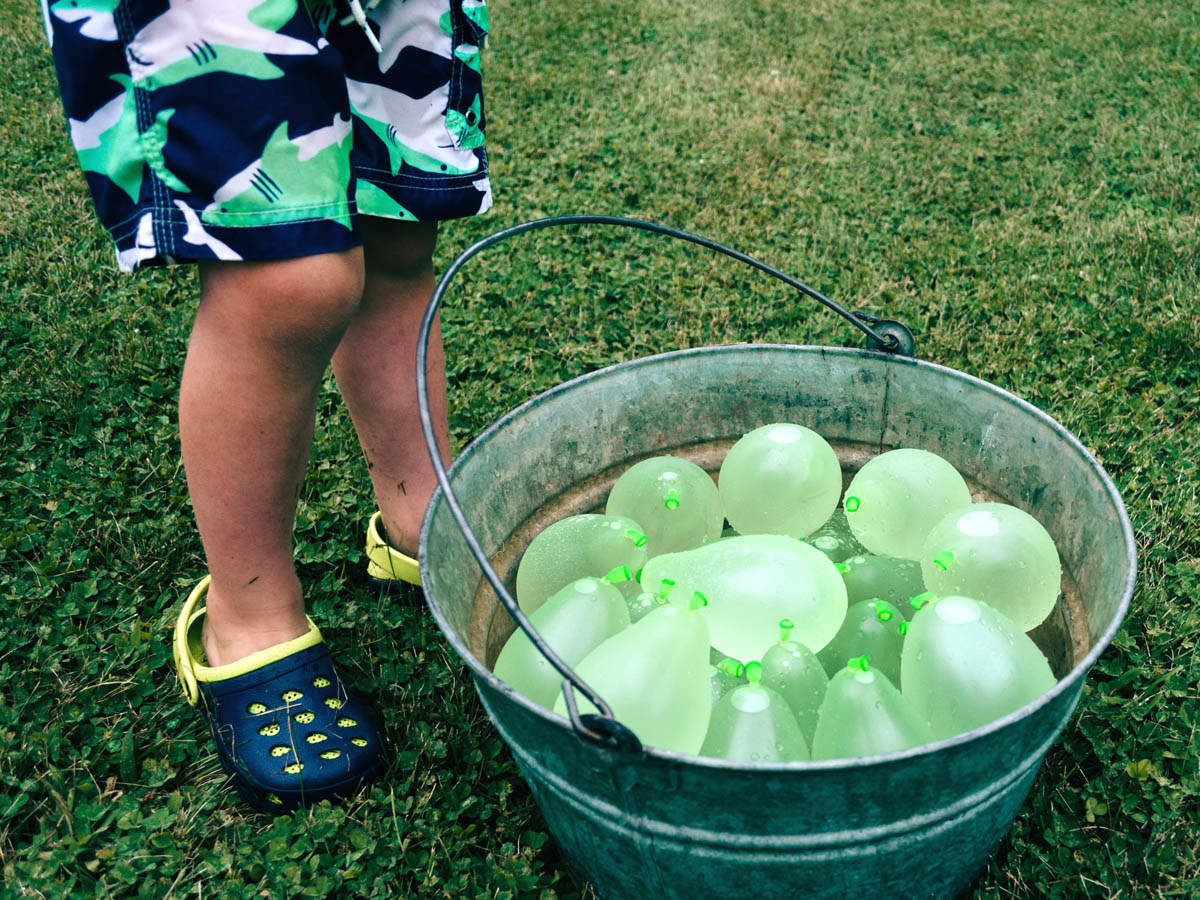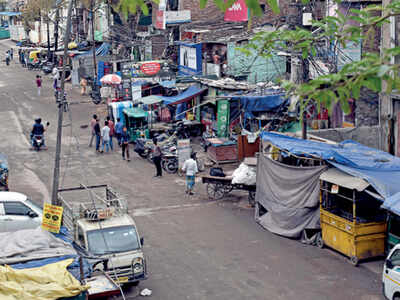
NOIDA: The JJ Colony slum cluster comprising sectors 5, 8, 9 and 10 has been the largest cluster in the entire district so far with over 90 Covid cases reported from the area.
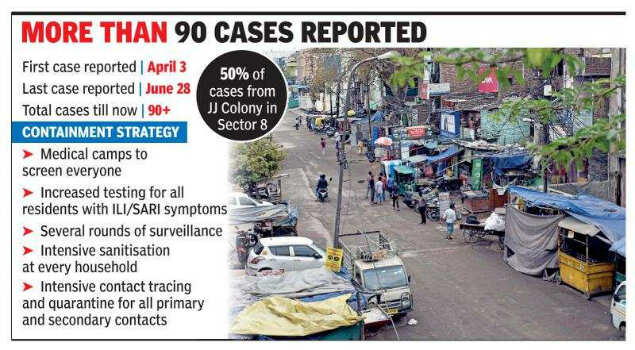
With around 50% of the cases reported from Sector 8, the cluster was often compared to the Dharavi slums of Mumbai, which has already reported over 2,000 cases.
In this high-density cluster, the first case was reported as early as April and it continued till the last week of June.
However, officials confirmed that no case has been reported in July yet. They said that with intensive containment and medical camps, cases from the area have now stopped emerging.
Following directions from the Paul committee on Tuesday, the district administration is now preparing a report on how cases were reduced and what challenges were faced in the process.
District magistrate (DM) Suhas LY said that they put in all efforts to contain the big cluster. “From contact tracing to sanitisation, testing and surveillance we increased everything to cover the entire area. Despite the high density of population, each household was surveyed and sanitised,” he said.
In the first Covid case, which was reported in mid-March, a domestic staff, who worked for a Ceasefire employee, and her family were found Covid positive.
Following this, a few other suspected Tablighi Jamaat members were tested but were found negative. However, some of their secondary contacts tested positive later, but they could not be attributed to the same cluster. Cases then started to grow in the area and spread from the JJ Colonies of Sector 5 and 8 to those in Sector 9 and 10.
Till then, 34 cases were reported and over 300 contacts were quarantined.
To increase focus in the area, officials said that they formed a special strategy in the first week of May. The strategy included three main steps — strict sealing similar to a curfew, deep sanitisation of every household, contact tracing and setting up of medical camps.
Doctors were also deployed at the medical camps in JJ Colony for three to four hours thrice a week to check everyone with any health issue. Announcements were made through loudspeakers asking everyone to get themselves checked.
Narendra Bhooshan, nodal officer for Covid-19 response in the district, said that it was almost like a walk-in testing in the area. And it was the first place to get a system like this. “Everyone was asked to visit the health camp. They were screened for influenza like illness (ILI) and severe acute respiratory infections (SARI) symptoms. We also conducted at least three rounds of surveillance in the area, while it is usually done once in areas with a positive case,” he said, adding that strict monitoring was essential as the population density of the area is a lot and following social distancing norms was a little difficult.
For people in other areas, an average of five contacts used to be quarantined but for initial cases in JJ Colony, we quarantined over 300 contacts overnight, an official said, adding that later in June, pool testing was also done in the cluster. Samples were collected from Sectors 4, 5, 6, 8, 9 and 10 and four pools from Sectors 5, 8 and 9 had tested positive.

With around 50% of the cases reported from Sector 8, the cluster was often compared to the Dharavi slums of Mumbai, which has already reported over 2,000 cases.
In this high-density cluster, the first case was reported as early as April and it continued till the last week of June.
However, officials confirmed that no case has been reported in July yet. They said that with intensive containment and medical camps, cases from the area have now stopped emerging.
Following directions from the Paul committee on Tuesday, the district administration is now preparing a report on how cases were reduced and what challenges were faced in the process.
District magistrate (DM) Suhas LY said that they put in all efforts to contain the big cluster. “From contact tracing to sanitisation, testing and surveillance we increased everything to cover the entire area. Despite the high density of population, each household was surveyed and sanitised,” he said.
In the first Covid case, which was reported in mid-March, a domestic staff, who worked for a Ceasefire employee, and her family were found Covid positive.
Following this, a few other suspected Tablighi Jamaat members were tested but were found negative. However, some of their secondary contacts tested positive later, but they could not be attributed to the same cluster. Cases then started to grow in the area and spread from the JJ Colonies of Sector 5 and 8 to those in Sector 9 and 10.
Till then, 34 cases were reported and over 300 contacts were quarantined.
To increase focus in the area, officials said that they formed a special strategy in the first week of May. The strategy included three main steps — strict sealing similar to a curfew, deep sanitisation of every household, contact tracing and setting up of medical camps.
Doctors were also deployed at the medical camps in JJ Colony for three to four hours thrice a week to check everyone with any health issue. Announcements were made through loudspeakers asking everyone to get themselves checked.
Narendra Bhooshan, nodal officer for Covid-19 response in the district, said that it was almost like a walk-in testing in the area. And it was the first place to get a system like this. “Everyone was asked to visit the health camp. They were screened for influenza like illness (ILI) and severe acute respiratory infections (SARI) symptoms. We also conducted at least three rounds of surveillance in the area, while it is usually done once in areas with a positive case,” he said, adding that strict monitoring was essential as the population density of the area is a lot and following social distancing norms was a little difficult.
For people in other areas, an average of five contacts used to be quarantined but for initial cases in JJ Colony, we quarantined over 300 contacts overnight, an official said, adding that later in June, pool testing was also done in the cluster. Samples were collected from Sectors 4, 5, 6, 8, 9 and 10 and four pools from Sectors 5, 8 and 9 had tested positive.

Coronavirus outbreak
Trending Topics
LATEST VIDEOS
City
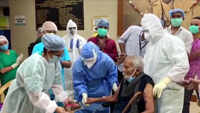 Watch: 101-year-old Mumbai man recovers from Covid-19, hospital staff celebrates his birthday
Watch: 101-year-old Mumbai man recovers from Covid-19, hospital staff celebrates his birthday 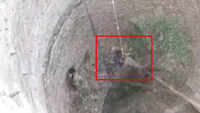 On cam: Drunk man falls into 100-feet-deep dilapidated well, rescued in Andhra Pradesh
On cam: Drunk man falls into 100-feet-deep dilapidated well, rescued in Andhra Pradesh 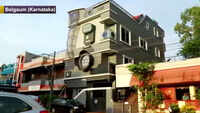 Love for photography: Man builds 3-storey camera-shaped house in Karnataka’s Belagavi
Love for photography: Man builds 3-storey camera-shaped house in Karnataka’s Belagavi 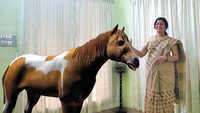 Kochi school teacher uses Augmented Reality Technology for conducting Lower Primary online classes
Kochi school teacher uses Augmented Reality Technology for conducting Lower Primary online classes
More from TOI
Navbharat Times
Featured Today in Travel
Quick Links
Kerala Coronavirus Helpline NumberHaryana Coronavirus Helpline NumberUP Coronavirus Helpline NumberBareilly NewsBhopal NewsCoronavirus in DelhiCoronavirus in HyderabadCoronavirus in IndiaCoronavirus symptomsCoronavirusRajasthan Coronavirus Helpline NumberAditya ThackerayShiv SenaFire in MumbaiAP Coronavirus Helpline NumberArvind KejriwalJammu Kashmir Coronavirus Helpline NumberSrinagar encounter
Get the app



